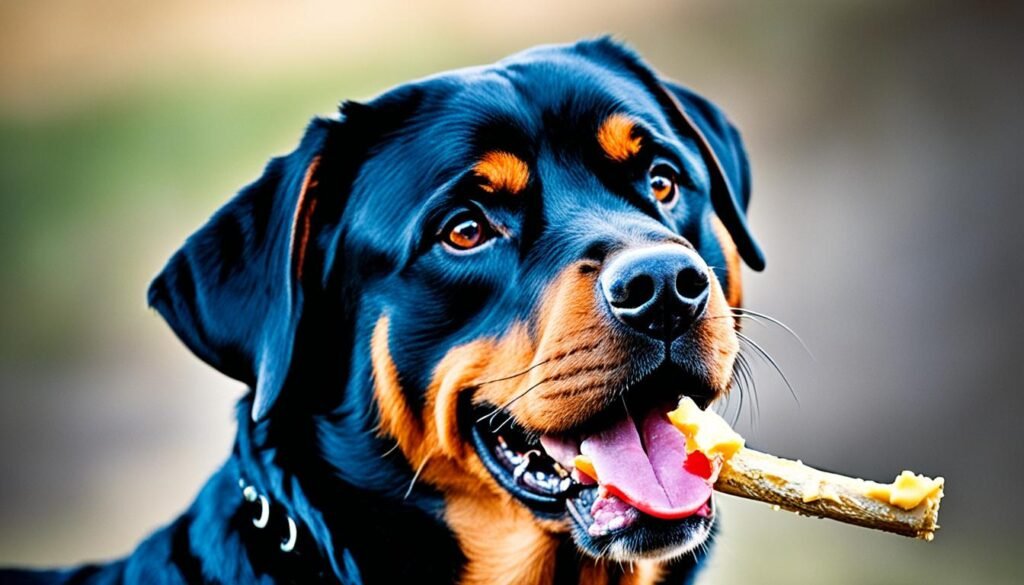As a proud Rottweiler owner, I’ve always strived to provide the best care and nutrition for my furry companion. Like many dog owners, I’ve had moments where I’ve questioned whether certain human foods are safe for my Rottweiler to consume. One particular concern that arose was whether Rottweilers can eat butter.
I remember one time when I accidentally dropped a pat of butter on the floor, and before I could react, my Rottweiler, Rocky, swooped in and devoured it in an instant. In that moment, a mix of worry and guilt washed over me. Was it safe for him to have eaten butter?
Curiosity led me to research the matter extensively, consulting with veterinarians and diving into scientific findings. Today, I want to share with you what I’ve learned about whether Rottweilers can eat butter and the potential impact it can have on their health and well-being.
Key Takeaways:
- Butter is not recommended for Rottweilers due to its high saturated fat content and minimal nutritional value.
- Feeding butter to Rottweilers can increase the risk of pancreatitis, obesity, and joint problems.
- Dogs can be lactose intolerant, making butter consumption even more problematic for their digestive system.
- Both salted and unsalted butter should be avoided, with salted butter posing greater risks due to excessive salt intake.
- Avoid feeding buttered foods such as popcorn, margarine, and buttered bread to Rottweilers, as they can lead to various health issues.
Why Butter is Bad for Dogs
While butter is not considered toxic to dogs, it is not recommended to feed it to them, especially for Rottweilers. The high saturated fat content in butter can be detrimental to a dog’s health, posing several risks and potential complications.
One significant risk of feeding butter to dogs is an increased likelihood of pancreatitis. The pancreas plays a crucial role in digestion, and consuming butter, with its high fat content, can cause inflammation in the pancreas. Pancreatitis can be a painful and potentially life-threatening condition for dogs.
Obesity is another concern when it comes to dogs consuming butter. Butter is calorie-dense and can contribute to weight gain if fed in excess. Rottweilers, in particular, are prone to weight gain and obesity, which can lead to various health problems, including joint issues and decreased mobility.
Additionally, some dogs may be lactose-intolerant or have difficulty digesting dairy products. Butter, being a dairy-based product, contains lactose, which can trigger digestive issues such as diarrhea, gas, and stomach upset in these dogs.
To ensure the overall well-being of Rottweilers and promote their optimal health, it is best to prioritize a well-balanced and nutritionally complete diet. This means avoiding the inclusion of butter in their meals and snacks. Instead, focus on providing them with high-quality dog food that meets their specific dietary needs and is recommended by veterinarians.
Risks of Salted vs. Unsalted Butter

When it comes to feeding dogs, both salted and unsalted butter should be avoided. However, salted butter poses greater risks to their health. This is primarily due to the excessive salt content present in salted butter, which can have detrimental effects on dogs.
Excessive salt intake can lead to dehydration in dogs, affecting their overall well-being.
If a dog ingests salt or large amounts of salted butter, it is crucial to take immediate action by contacting a veterinarian. They can provide guidance on how to address the situation efficiently and effectively.
To ensure the overall health and well-being of your furry friend, it is best to avoid feeding any type of butter to dogs, both salted and unsalted. While it may be tempting to share a treat with your beloved canine companion, it’s important to prioritize their wellness by offering them nutrition that aligns with their specific dietary needs.
Remember, dogs have unique nutritional requirements, and their diet plays a significant role in their overall health. Instead of relying on butter as a source of flavor, explore alternative dog-friendly options that provide both taste and nutrition without sacrificing their well-being.
Can Dogs Eat Buttered Foods?

Dogs should avoid consuming any buttered foods, including buttered popcorn, margarine, and buttered bread. While these foods may seem tempting, they can have adverse effects on a dog’s health.
Buttered Popcorn: Can dogs eat buttered popcorn? It’s best to steer clear of giving popcorn that is coated in butter to your furry friend. Buttered popcorn contains the same health risks as butter itself, including the potential for pancreatitis and obesity. The high fat content can be detrimental to a dog’s digestive system and overall well-being.
Margarine: The question of whether dogs can eat margarine arises as an alternative to butter. While margarine is not dairy-based, it can contain additives and preservatives that are not healthy for dogs. These additives may cause stomach upset and gastrointestinal issues in dogs if consumed in large quantities.
Buttered Bread: Can dogs eat buttered bread? It is advisable to avoid feeding dogs bread that is slathered in butter. Buttered bread, especially when given as a treat, can lead to various health issues over time. Excessive fat consumption can contribute to obesity, pancreatitis, and other potential complications in dogs.
It is crucial to prioritize a well-balanced diet for your canine companion, focusing on foods that are safe and beneficial for their health. Limiting their intake of high-fat foods, including buttered foods, is essential for their overall well-being.
Dogs should not consume any buttered foods, including buttered popcorn, margarine, and buttered bread. Providing a healthy and balanced diet is key to ensuring their long-term health and happiness.
What to Do if Your Dog Ate Butter
If your dog accidentally consumes a small amount of butter, it may experience mild stomach issues due to the high fat content or lactose intolerance. However, if your dog ingests a larger amount of butter, it can lead to severe stomach issues and potentially pancreatitis. It is crucial to monitor your dog closely if they have consumed a significant amount of butter and contact a veterinarian for guidance.
Symptoms of excessive butter consumption in dogs include vomiting, diarrhea, and stomach pain. If you notice any of these symptoms or are concerned about your dog’s health, it’s important to seek professional help. Veterinarians are trained to assess the situation and provide appropriate advice and treatment.
When reaching out to a veterinarian, be prepared to provide information about the amount of butter ingested, the size and breed of your dog, and any noticeable symptoms. This information will help the veterinarian determine the best course of action for your dog’s well-being.
Remember: even a small quantity of butter is too much for a dog’s daily fat intake. It’s always better to err on the side of caution and seek professional guidance to ensure your dog’s health and safety.
Conclusion
Feeding butter to Rottweilers should be avoided in their diet due to the health risks it can pose. Rottweilers require a well-balanced nutrition plan that fulfills their specific dietary needs, without the addition of butter or buttered foods. It is crucial to consult with a veterinarian to ensure you are providing the best food choices for your Rottweiler, taking into consideration factors such as age, health history, and individual dietary requirements.
While butter is not toxic to dogs, it is high in saturated fat and lacks significant nutritional value. Intentionally feeding butter to Rottweilers can increase the risk of developing pancreatitis, obesity, and joint problems. Furthermore, dogs, including Rottweilers, can be lactose-intolerant, which can lead to digestive issues when consuming butter.
To maintain the overall well-being of your Rottweiler, it is recommended to prioritize a balanced diet consisting of high-quality dog food that meets their nutritional needs. Avoiding butter and buttered foods will help safeguard their health and promote longevity. Remember, providing the best nutrition is key to keeping your Rottweiler happy and healthy.
FAQ
Can Rottweilers eat butter?
While butter is not toxic to dogs, it is not recommended to feed it to Rottweilers. Butter is high in saturated fat and offers little nutritional value to dogs. It can have negative effects on their organs and overall health, such as increasing the risk of pancreatitis, obesity, and joint problems. Dogs can also be lactose-intolerant, which can further upset their stomachs. It’s important to avoid intentionally feeding butter to your Rottweiler.
Why is butter bad for dogs?
Butter is not considered toxic to dogs, but it is not recommended to feed it to them. The high saturated fat content in butter can lead to health issues like pancreatitis, obesity, and joint problems in dogs. Additionally, dogs can be lactose-intolerant, which can cause stomach upset when consuming butter. It is essential to prioritize a well-balanced diet for Rottweilers instead of including butter in their nutrition.
What are the risks of feeding salted vs. unsalted butter to dogs?
While both salted and unsalted butter should be avoided when feeding dogs, salted butter poses greater risks. Excessive salt intake can lead to dehydration in dogs. If a dog ingests salt or large amounts of salted butter, it is important to contact a veterinarian immediately. It is best to avoid feeding any type of butter to dogs, both salted and unsalted, to ensure their overall well-being.
Can dogs eat buttered foods like buttered popcorn, margarine, or buttered bread?
Dogs should not consume any buttered foods, including buttered popcorn, margarine, and buttered bread. Buttered popcorn contains the same health risks associated with butter, including pancreatitis and obesity. Margarine, although not dairy-based, can contain additives and preservatives that are not healthy for dogs. Buttered bread, especially when given as a treat, can lead to various health issues over time. It is best to avoid feeding these buttered foods to dogs.
What should I do if my dog ate butter?
If a dog accidentally consumes a small amount of butter, it may experience mild stomach issues due to the high fat content or lactose intolerance. However, if a dog ingests a larger amount of butter, it can lead to severe stomach issues and potentially pancreatitis. It is crucial to monitor the dog closely if they have consumed a significant amount of butter and contact a veterinarian for guidance. Symptoms of excessive butter consumption include vomiting, diarrhea, and stomach pain. It is important to remember that even a small quantity of butter is too much for a dog’s daily fat intake.
Can butter be included in a Rottweiler’s diet?
Butter should not be included in a Rottweiler’s diet due to the health risks it poses. Rottweilers should be fed a well-balanced diet that meets their nutritional needs, without the addition of butter or buttered foods. It is essential to consult with a veterinarian regarding any new foods or treats for a Rottweiler, as individual factors such as age, health history, and dietary requirements can impact what is suitable for their specific needs.
